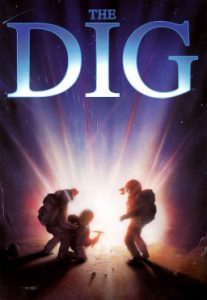1003rd played so far
Genre: Adventure
Platform: PC
Year of Release: 1995
Developer: LucasArts
Publisher: LucasArts
While I missed out playing some minor titles – Labyrinth and Indiana Jones and the Last Crusade – I have played all the really known Lucasarts adventure games once I’ve played today’s game. I haven’t quite finished all of them, but the blog has both had me hold back from playing them until they fit into the rotation and encouraged me to play through their various games.
Out of them, it feels like The Dig is seen as one of the lesser games in the LucasArts adventure canon. While it has a notable set of people behind it – part of the game was written by Orson Scott Card while the core idea was by Steven Spielberg – the production sounds like it was messy enough to the point where the game had to compromise and we didn’t get the best it could be. For me, one of the results of that is that it’s a shorter game, which means I might finish it sooner, but there’s still some love for having a more serious sci-fi story in an adventure game, rather than the comedic tales that the studio was known for.
Adventure
Adventure games are probably my first video game genre love. I was playing platformers earlier and got quite addicted to some puzzle games too, but the narrative pull of an adventure game and its ability to tell a story really appealed to me – I sought them out when I could. In particular, I remember a library book coming with a demo disc that had the Monkey Island demo – which you can’t win by following the walkthrough of the main game. We did figure out eventually though – a real family effort if I remember right.
With that said, I do have to address one failing of the book when it comes to point and click adventures. While it covers almost the entire LucasArts library, it only has a single Sierra entry, and that’s the fairly middle of the road Gabriel Knight II – not a game I’d expect to see as the pinnacle of the studio, but more an example of an FMV adventure as they appeared in the mid-1990s. And while they may not all have been great, it’s hard to argue against King’s Quest being one of the main originators of the genre as we know it now, or that Quest for Glory is an early example of mixing genres that even now is loved.
And, as I went through in The Legend of Zelda: Twilight Princess, action/adventures are their own genre. It is often used not to describe a game that provides you the interactive storytelling that comes with most adventures, but rather one where the secondary genre is combined with some amount of exploration and storytelling beyond the basic that come with most genres. It’s a pretty vague standard and term, though, that I still find tricky to distinguish.
Our Thoughts
Any issues with the game’s development aside, I do feel this game succeeds quite well at telling its story. During a space mission, you end up on an alien world removed from any contact with Earth. It’s abandoned and mostly lifeless. You focus both on getting home and figuring out what’s going on in the world – the two mysteries are, of course, related. The game is filled with a lot of detail of the race that used to live there, not all of which is required to finish the game, but all of which is interesting. There are plenty of smaller touches that give you more information on what’s going on and it’s a world that feels that bit more real because of it.
Although the cast is limited – for the most part you’re exploring on your own and in touch remotely with Maggie, a linguistics expert and reporter. The German archaeologist Ludger shows up for the first part, as a sarcastic counterpart, but sadly he comes and goes and loses some of its snarky contributions.
One of the nicer parts of the game’s structures is that the puzzles stay quite focused and often local. While you might move a few items further, the solutions to a lot of other things stay local: you need to fix something that’s right there, with the tools you find there. While it doesn’t always hold up, there are plenty of shortcuts you unlock so the frustration gets less. Your choices also often seem restricted enough that you don’t have to worry too much about what you need to do, again helping the puzzles stay manageable.
Final Thoughts
I don’t think I’d describe The Dig as the best LucasArts adventure. When it comes to more serious stories in an amazing world, Loom feels unbeatable, while it feels hard to draw a comparison to the – often larger – comedic games. It does still create an interesting world to explore that continued to be rewarding throughout and if you like the genre, this is a game worth following up on – even if not the best LucasArts game, in the genre as a whole it is still really good.
